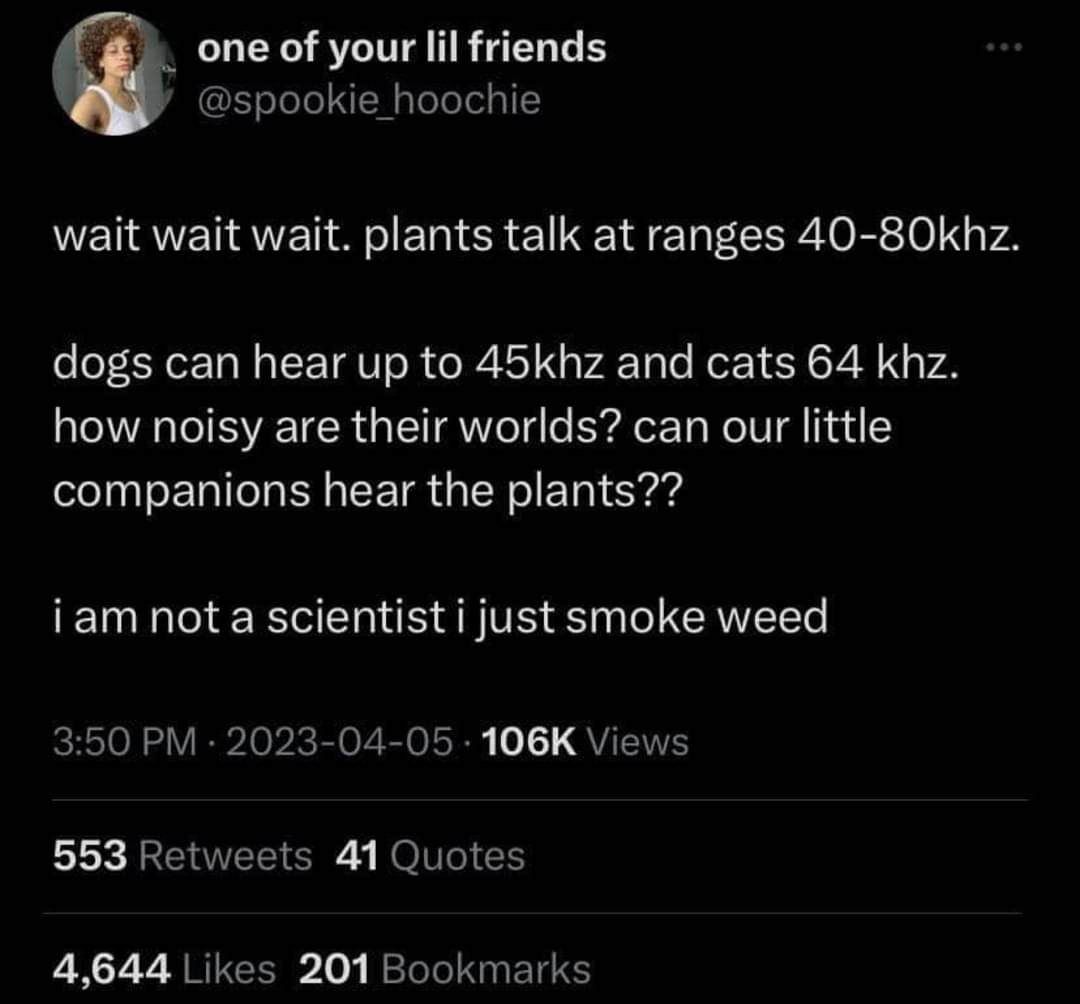I was told to touch grass, but when I did that it yelled "sexual harassment."
Science Memes
Welcome to c/science_memes @ Mander.xyz!
A place for majestic STEMLORD peacocking, as well as memes about the realities of working in a lab.

Rules
- Don't throw mud. Behave like an intellectual and remember the human.
- Keep it rooted (on topic).
- No spam.
- Infographics welcome, get schooled.
This is a science community. We use the Dawkins definition of meme.
Research Committee
Other Mander Communities
Science and Research
Biology and Life Sciences
- !abiogenesis@mander.xyz
- !animal-behavior@mander.xyz
- !anthropology@mander.xyz
- !arachnology@mander.xyz
- !balconygardening@slrpnk.net
- !biodiversity@mander.xyz
- !biology@mander.xyz
- !biophysics@mander.xyz
- !botany@mander.xyz
- !ecology@mander.xyz
- !entomology@mander.xyz
- !fermentation@mander.xyz
- !herpetology@mander.xyz
- !houseplants@mander.xyz
- !medicine@mander.xyz
- !microscopy@mander.xyz
- !mycology@mander.xyz
- !nudibranchs@mander.xyz
- !nutrition@mander.xyz
- !palaeoecology@mander.xyz
- !palaeontology@mander.xyz
- !photosynthesis@mander.xyz
- !plantid@mander.xyz
- !plants@mander.xyz
- !reptiles and amphibians@mander.xyz
Physical Sciences
- !astronomy@mander.xyz
- !chemistry@mander.xyz
- !earthscience@mander.xyz
- !geography@mander.xyz
- !geospatial@mander.xyz
- !nuclear@mander.xyz
- !physics@mander.xyz
- !quantum-computing@mander.xyz
- !spectroscopy@mander.xyz
Humanities and Social Sciences
Practical and Applied Sciences
- !exercise-and sports-science@mander.xyz
- !gardening@mander.xyz
- !self sufficiency@mander.xyz
- !soilscience@slrpnk.net
- !terrariums@mander.xyz
- !timelapse@mander.xyz
Memes
Miscellaneous
Sexual grassment
I'm something of a "not a scientist" myself
Same. Would like answers.
Did some searching. The paper from 2019 that discussed this -
We recorded 65 dBSPL (dB of sound pressure level) ultrasonic sounds 4 inches (10 cm) from tomato and tobacco plants, implying that these sounds could be detected by some organisms from up to several feet (meters) away.
https://www.sci.news/biology/plants-ultrasonic-clicks-07895.html
I would like some weed. As a nonscientist, answers come secondary to weed.
"I am not a scientist, I just smoke weed" needs to be a shirt.
I'm not sure what it actually means though
"High thoughts," almost like shower thoughts, but driven by weed and, in my experience, learning an interesting fact or tidbit.
So they're not a scientist and don't have formal training in sounds or plants or animals, they learned a fact and got high and connected some dots, haha
imagine a shirt that says "I'm not a scientist". it's basically that but if you smoke weed you are obligated to tell everyone unprompted, so this is for weed smokers who want a shirt that says I'm not a scientist.
a further idea: Front of the shirt says "I am not a scientist"
Back of the shirt says "I just smoke weed"
That explains why my fuzzy terrorist always wants to bite them.
Yes, if the plant is screaming at having its leaves torn, my little psychopath would absolutely be like “bite it harder!”
Wait... If the plants are whispering to my cat late at night. Is that why the little fucker spazzes out and goes crazy all over the house at 3 am?
Well, during the day plants are busy working (photosynthesising, defending, sticking pollen to bugs), they only have a chance to get socially chatty at night.
And cats love plant humour.
Except that of succulents. They crunch too much.
Did some checking, out of curiosity.
And yeah. Interesting as hell.
We recorded 65 dBSPL (dB of sound pressure level) ultrasonic sounds 4 inches (10 cm) from tomato and tobacco plants, implying that these sounds could be detected by some organisms from up to several feet (meters) away.
https://www.sci.news/biology/plants-ultrasonic-clicks-07895.html
Your move, vegans
Been waiting 17 years to pull that out, lol. Perfect.
CARROTS CAINT FIGHT BACK
Pineapples dissolve your mouth. Anything with capsaicin is non verbally asking you not to eat it.
…and anything with that many spikes on it is visually threatening your gullet, but it’s still delicious.
Oh good. I was worried they were defenseless.
Plants talk? As in rustle with movement or communicate through sound? Can plants hear? The world is amazing, I’ll be on Wikipedia for a few.
There are high frequency sounds that they emit when they experience certain stimuli, for example when not having enough water or leaves being torn. As far as I know some other plants or insects might be evolutionarily tuned to recognize those sounds and react to them. So yes, in a way plants can talk.
does that mean cats hear house plants scream while they are chewing on their leaves
It's why they do it!
I'm not a cat or a plant scientist.
This is what happens when you get too high and Dr Dog - Listening In is playing
That's actually the first time I've seen Dr Dog referenced in the wild (outside of Pat Finnerty's channel.)
How do we know that sound signals recorded aren’t just from the release of biomolecules? Using the nervous system to produce sound is a more intentional process than the release of biomolecules for chemical signaling, which is something even simple multicellular organism do
You're right that it doesn't have to be talking. But it is a sound cats and dogs can hear. They do hear the plant noise, which is cool.
It's cool to us.
I can absolutely confirm that neither cats nor dogs particularly enjoy hearing multiple frequencies in that range, as I use ultrasonic noisemakers to train dogs and cats. Both species have had specific individuals that reacted as though I had just beaten them, and all the individuals of both species reacted in such a way that it was clear that they would do just about anything to never hear those noises again.
That being said, I wonder if they could hear that frequency all the time and were freaked out that a human was shouting in plant language.
Right, but what’s the source of the sound? If it’s not intentionally produced, but rather a chemical reaction or reaction byproduct, then it says something different about plant communication
I agree, I just don't think it's that relevant to the post, which was more about how our pets experience the world.
Is it possible to record those higher frequencies and then turn them down so I can hear how noisy it is for my dog at home?
Probably. If astronomers can convert the radio noise stars make into audible sound - and they can - then I don't see why we couldn't pitch adjust background noise to human-audible levels.
I'm not 100% on the pitching down bit, but key would be to get a mic that has those frequencies in its range.
"I can hear the innermost thoughts of plants" - yup, sounds crazy to me! (Therefore let's do it - make it happen!:-)
Sorry to link to CNN but I was skeptical and here's a good enough summary
https://www.cnn.com/2023/03/30/world/plants-make-sounds-scn/index.html
It would be really neat if someone made a sensor that could tell you whether your plant needs to be watered.
Yeah, I've messed around with water sensors before. I just thought it would be neat to measure it via stress on the plant itself.

